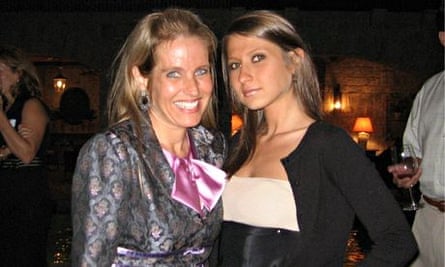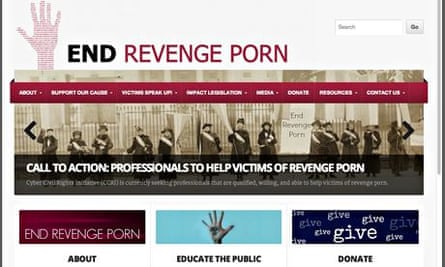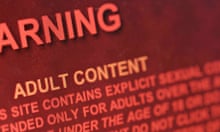I don't realise quite how brave Charlotte Laws is until I see her in action at the United States Court House in Los Angeles. I'd met her at her home two days previously, but for most of the interview she'd been sitting down, and it's only amid the imposing gloom of the 1940s building that I realise how tiny she is – less than 5ft tall, despite a pair of platform heels – and what exactly it is that she has taken on. We're waiting for a bail hearing in the case of the United States versus Charlie Evens, and Laws is clutching a stash of printouts from the internet which she shows the prosecutor before the judge arrives.
"What are these?" the prosecutor asks.
"They're my latest death threats," says Laws.
"What?" says the prosecutor. "Have you passed these on to the FBI?"
"I told the FBI press office," she says.
"No, you need to get these to an investigator. You need to contact the agent immediately." She leafs through the pages and then looks at Laws. "Are you concerned?"
Laws shrugs. "A bit."
I read them over her shoulder. They mostly came from anonymous Twitter accounts. Somebody called "DepressedSaintsFan" names her and then says: "We need to get a hit out on this bitch." Another calls her daughter "a cock-hungry slut". But it's just the tip of a larger, altogether nastier iceberg: phone calls, a strange car that turned up in her street, and dozens of abusive, barely literate threats and insults and libels against Laws, her daughter, her husband. This is the price you pay, it turns out, for taking on a 27-year-old website owner called Hunter Moore, or, as he came to be known, the "Most Hated Man on the Internet".
This is, given the internet, and what is on it, quite a title; it was bestowed by a BBC reporter back in 2012 and subsequently adopted by Moore as both a badge of honour and a handy marketing tool. If you traffic in human misery, it's the kind of endorsement that will bring in a few thousand more Twitter followers, more hits, more advertising revenue. Because Moore's website, isanyoneup.com, operated in the murky world of "revenge porn" – a modern-age phenomenon that almost makes you long for crinoline skirts and steam-powered engines.
Moore's schtick was publishing compromising photos and videos of women (and some men) together with their full names and as many identifying details as he and his followers could find: their geographic location, their occupation, their address. It was, like Facebook, he claimed, perfectly legal "user-generated content". It was usually their exes who sent him the photos, though others were mysteriously "found". Ex-boyfriends, ex-husbands, some ex-girlfriends out to humiliate their one-time partners. To compromise their jobs. To professionally embarrass them and personally hurt them. To reveal their most personal, intimate details to the world. And in some cases – the women who were judged not fit mothers because of pornographic content on the internet, or who were sacked from their jobs – to ruin their lives.
Moore called himself "a professional life ruiner". He compared himself to Charles Manson. And Charlotte Laws didn't just take him on. She mounted a two-year investigation into his activities, compiled a dossier of evidence from more than 40 victims all over the world, and then led the FBI to his front door. In January he was indicted for conspiracy, unauthorised access to a protected computer and aggravated identity theft. He faces up to 42 years in prison. "Unless he gets off," says Laws. But she doesn't really want to talk about that possibility. There are potential repercussions either way. Hunter Moore has "followers", people who identify themselves, after Charles Manson, as The Family. It's unclear what they are or aren't capable of.
It's two years since Laws first heard Hunter Moore's name. Her daughter Kayla, then 24, was an aspiring actor who was working as a waitress in a restaurant, and her email and Facebook accounts were hacked. Nine days later a friend told her that a topless photo of her had been published on the internet, alongside her name, her location and her Facebook and Twitter IDs. Minutes later, she was on the phone to her mother. "She was freaked out; she was in tears. She said: 'Something horrible happened' and she came home and she didn't want to come out of her room. It was embarrassing and humiliating and all her friends knew and the picture was passed around her workplace. It just… kind of circulates, you know?"
Kayla had taken the photo herself but had never shown it or sent it to anyone. She'd emailed it to herself from her phone to save on her computer. She had a boyfriend she describes as "religious, conservative Jewish" who "would be really judgmental about things like Halloween outfits" let alone a nude photo on the internet. Her assistant manager told her he could get her fired. She was desperate to get the photo down.
Her case, and others like it, are routinely described as "revenge porn", but it's a misleading description in all sorts of ways. Kayla's photo wasn't porn; it was a "cute shot" of the kind that Generation Selfie takes almost as reflexively and thoughtlessly as breathing. And it wasn't posted in revenge. It was hacked, opportunistically: the crime that Charlie Evens, whose bail hearing I attend with Charlotte Laws, stands co-accused of alongside Moore. He stands in another huddle from us, just down the corridor, an ordinary-looking young man, in a new suit, with a worried-looking mother.
Kayla's photo was never meant to be seen. Not by Moore's 600,000 Twitter followers, or the fans who made up his 30m monthly unique page views, not by her friends and co-workers and boss. She had six Facebook friends in common with Evens but believes she was selected at random. Did you feel judged by people? "Oh completely. By a huge group of people that I was friends with growing up. They all distanced themselves completely from me. People thought I'd put it up there myself."
For Charlotte Laws it was an unexpected, unwelcome entrée into a seedy underworld that until that point she'd known nothing about. For an 11-day period back in 2012, she threw herself into getting Kayla's photo off the internet. She wrote to Moore and asked him to remove it in accordance with the terms of the Digital Millennium Copyright Act. He ignored it. She wrote to his attorney. To his hosting service. To Facebook. To his internet security company. She tried to find an expert to take the case on. But, she says:"I quickly realised there were no experts." She had no choice but to become the expert.

Finding out about revenge porn meant finding out about Hunter Moore. This was an easier job than it might have been because Moore studiously cultivated a bad-boy image via any outlet available to him. The more outrageously he behaved, the more publicly, the more traffic it brought him. At one stage he claimed to be making $30,000 a month from isanyoneup.com, as he was happy to tell any journalist who showed up for the ride. While Laws was desperately trying to get her daughter's photo off the internet, a reporter from Rolling Stone was out clubbing with him. The resulting profile is from the grand tradition of gonzo journalism: the writer watches while Moore has sex and snorts coke with a pair of groupies in a nightclub. "Later that night, back in his hotel room, [one of the women] agreed to do her line off his erect penis as he snapped a photo of this and uploaded it to Tumblr."
The profile paints a portrait of Moore as a man who, it says in the strap line, "wants to become a new-media kingpin in the old-fashioned way – through drugs, women and porn". Wading in the gutter was "just the cost of doing business". There's more than a touch of admiration in the piece. Moore himself saw it as the ultimate brand endorsement. "Rolling Stone Featured" is the first line of his (now defunct) Twitter profile. He had become the Most Hated Man on the Internet. The only problem now was fulfilling his daily notoriety quotient: his Twitter feed had to be fed; he needed more victims, more outrage.
For journalists, though, there was no shortage of copy. The Village Voice's reporter opens her piece on Moore by recounting a journey in a stretch limo in which he "is trying to screw a 20-year-old woman on my lap" and goes on to describe how Facebook had banned the site. "Moore enjoys telling everyone that he responded with a picture of his dick."
The press coverage, Laws points out, was part of the problem. "He loved that Rolling Stone article. He was really proud of that. It glorified him. There was this sense of: 'Oh, he's just a bad boy, but he's OK.' A lot of people out there thought he was weird but probably harmless. And the victims weren't being heard. I called a couple of journalists and said: 'There's another point of view. You're glorifying Hunter Moore.' And they'd say: well, what victim can I interview?' And I'd say: 'The victims don't want to come forward.' So it was either I do it, or no one would."
First, though, she had to get the photo down. Even her own husband, a lawyer, didn't understand the gravity of the situation at first. "He was like: 'Ignore it. It'll go away.' He just didn't understand the internet and how a picture can populate and go from site to site." How it can be out there for ever.
She contacted the LA police who "basically said Kayla shouldn't have taken the photo", and in desperation rang the FBI. "If a hacker hadn't been involved, there would have been no case to answer and the site would still be up. But because there was, they took it seriously," she says. Eleven days later, her husband spoke, attorney to attorney, to Moore's legal representative and told him about the FBI investigation, and the photo finally came down. Basically, says Kayla, "they messed with the wrong mom".
For Laws, though, it couldn't stop there. "There were 50-year-old women on Hunter Moore's site. It wasn't necessarily 20-year-old kids. There was a blind paraplegic, a person of restricted growth. Apparently someone had got hold of nude photos of a woman in a morgue and there was a discussion about 'Should I post the dead girl or not?' I don't think he did in the end, but I'm not sure."
It's hard to pick the worst cases. The teacher who was dismissed from her job after a link to the material was emailed to her head teacher. The woman who had post-surgical medical photographs of her breasts published. They were bloodied and bandaged and it turned out that her doctor's office had been hacked. Dozens of others, ordinary women, many of them middle-aged, in serious jobs, who found that their faces had been Photoshopped on to porn actors' bodies.
"I'm not an emotional person, but I found myself in tears talking to these women," says Laws. "They were traumatised. I was only contacting the women who'd been uploaded on to the site in the day or two before or after Kayla, so a lot of them didn't even know. I had to break it to them and they were freaking out."
Kayla's photo came down "just in the nick of time". A day later, the entire site was mirrored and uploaded on to a different server, a server not in the US; and getting photos down in those circumstances is nigh-on impossible. As far as Laws, is concerned, it's a way of silencing women. Of driving them from the internet. Of shaming them.
Charlotte Laws is 53 years old and grew up in "old-money Atlanta", attending a private prep school and coming out as a debutante. And she was "ostracised from everybody I knew, my entire family, because I supported equal rights for blacks. They weren't allowed at our country club. They weren't allowed in my school until 1966, and I never saw one while I was there." Her experience of revenge porn has exposed her to another world in which basic civil rights don't exist: the internet. "We're re-fighting the old battles. It's just a new frontier. It's this unexplored territory, so we have to start from scratch and find our way again and assert our rights and make sure that women have an equal ability to be on the internet and not harassed."
"Revenge porn" doesn't cover the half of it, she believes. "It's pure misogyny. It's about hating women. It's about hurting them. That's the whole purpose of the site. It wasn't about the pictures. There were hundreds of people self-submitting photos, but they're not victims because they are saying: 'Hey, you can post my nude picture.' But that wasn't interesting. The thing is humiliating people. The kind of people who would never post their photo on a site like that, and who have a lot to lose. Who have high-profile jobs, or could have their entire life destroyed. That's what he found enjoyable. That's what his followers found enjoyable."
The problem with being the most hated man on the internet, Moore discovered, was keeping up the bad behaviour. Maintaining the brand identity. In the Rolling Stone profile, it gets to the point where he can't be bothered to have sex with his groupies, though he feels he really ought to for the sake of his stats, his traffic. The problem, he tells the reporter, is that "I have parts of my personality where I am a fucking dick", but Hunter Moore is, at least in part, he says, a "character" he has created.
But then Hunter Moore is what happens in world in which populism has a cash payoff, and there are almost no laws in place to check the uglier urges of human nature or, as we call it, the internet. He isn't, however, to be found there any more. Moore was released on a $100,000 bond, awaiting trial, to the care of his parents, with whom he still lives. They were ordered to institute parental controls on their internet. Moore's Twitter feed has fallen silent, though if you want an insight into the more moronic side of the web, search #TheFamily on Twitter . His "followers" keep up a steady stream of posts that range from the illiterate to the actionable.

After meeting Laws, I take a trip out to Woodland, California, the dormitory town near Sacramento where Moore lives. It's about as Normalville as anywhere you can imagine. His parents' house is a neat, freshly painted suburban home with a neat, well-tended garden in a neat, quiet street. He's gone to ground since the arrest. The prospect of 42 years in jail has brought an end to his clubbing days with willing journalists. There's no one home, though the neighbours chat. His parents, one of them tell me, are the nicest people you could hope to meet. "My car was stolen and was returned to me all beaten up and I couldn't afford to fix it up and Hunter's father came and did everything. Wouldn't let me pay for the parts. He did the whole thing. It was incredible – a lifesaver. But Hunter…" and she shakes her head.
"I've known him my whole life. He grew up with my kids. But you know, some children. I mean… he… you know… I'd never blame the parents. I know how it happens. But he's always been in things. He wouldn't ever be told."
I drive around the town. It would be hard to find a quieter, more nondescript sort of place. There are streets and streets of American suburban houses, a few shopping malls, a McDonald's, a Walmart, a Days Inn. It's in the middle of the northern Californian agricultural flatlands. It is not a place from which to conquer the world. And yet, from his childhood bedroom, that is what Moore tried to do. Because that, after all, is the genius of the internet: that a nobody from nowhere can reach a global audience. For Moore, who dropped out of high school, who had no qualifications and no conventional prospects, humiliating women, hurting them, ruining their lives was a passport to fame, money, sex, drugs, and the kind of rock'n'roll lifestyle he'd read about in Rolling Stone magazine.
He told a writer from the Daily Beast in another 1am special ("I've fucked most of the girls here… All these girls are literally 17 years old. I might go to jail tonight") that the pivotal moment in his life was being dumped at the age of 15 by a girl called Rachel. "The only way to get to a point where you have no feelings, you have to have your heart ripped out and shit on."
But isanyoneup.com started by accident. He was seeing a girl "who was engaged to a kind of semi-famous band guy and all my friends wanted to see her naked". He uploaded the photos to a dormant domain he owned and a week later discovered he'd had 14,000 unique visits. "And I was like: 'Holy shit. I could make money doing this.'"
He started out with "self-submits" – photos women sent him themselves – but then realised that it was the people who didn't want to be up there, the teachers, lawyers, students, mothers who were getting the most hits. Ordinary women who'd made the mistake of trusting the wrong man, or who'd had their emails hacked, who were somehow in the wrong place at the wrong time. "I didn't used to post teachers," he told the BBC. "But then I realised that's where all the traffic is. I just monetise people's mistakes… if it wasn't me, somebody else was going to do it."
It's hard to know if Moore is actually dangerous or simply attention seeking. Charlotte Laws immersed herself in his world because, she says, "during the period when I was trying to take the photo down, that was the only way I could understand what he was thinking. And he was able to draw a lot of these very angry people who enjoy hating people and bullying and harassing and humiliating. And I mean this in the worst possible way, but I consider him a very charismatic leader, like Charles Manson, like Jesus. Someone who can draw a crowd. Many of them said they would kill for him. They would do anything for him."
Hunter Moore acted like he was invincible. He frequently cited the law that protects sites such as Facebook from being responsible for what users post. He taunted his victims. He encouraged his followers to mock them, to email their bosses, their co-workers, their families with links to their photos. What he hadn't counted on was the sheer, bloody-minded persistence of Charlotte Laws.
She spent weeks tracking down victims. She estimates that she has spoken to and helped well over 100 of them, victims of isanyoneup.com and a host of other sites. And when she'd done that she testified in support of a state anti-revenge porn bill and began work on getting a federal law passed. Kayla, her daughter, is trying to put the experience behind her and move on with her life.
But for Charlotte Laws there's no giving up now. "I'm always thinking about the next thing I can do. The next politician to try. It is very, very important that this is recognised as a criminal offence and that the law is changed."
Holly Jacobs, the founder of End Revenge Porn, tells me how inspired she was when she discovered what Laws was doing. A revenge-porn victim herself, she was "desperate at the time. Nobody even knew about the issue, let alone had come forward. To do what she did requires an incredible combination of persistence and anger." She also notes: "There is a personal cost in coming forward."
Jacobs should know. She has her own tale to tell. She was a PhD student when her ex-boyfriend of three years, from whom she'd split amicably, uploaded a dozen nude photos of her to a porn site. She hired an attorney and pursued the website owner and eventually got them taken down.
"And then, in 2011, two and a half years after we split up, a new stash of material was suddenly everywhere. It went completely viral. It was on more than 300 websites. And the worst thing was an explicit video, a webcam session that I wasn't even aware that he had recorded with my full name, my school's name." She was called into her dean's office and told there would have to be an investigation.
I listen to her story in horror. I tell her that it reminds me of the nightmares I've had, in times of stress, in which I find myself naked in the middle of the street. "That's exactly what it's like," she says. "It is that nightmare. But it's real life. And that material is going to be out there forever. For the rest of your life."
For three years Jacobs silenced herself. She withdrew, closed her Facebook profile and her Twitter account; at one point she even changed her name to try to dissociate her professional persona from the online material. And then she decided to come out fighting, setting up the Cyber Civil Rights Initiative, and asked Laws to become a member of its board.
They've joined forces with two academics, Danielle Citron, a law professor at the University of Maryland, and Mary Anne Franks, a law professor at the University of Miami, and are working on draft legislation for anti-revenge bills in 22 states and pushing for a new federal law. "We don't have laws online like we do in physical space," says Jacobs. "It's all happening all over again. Women are having to fight for their civil rights all over again on the internet."
Hunter Moore's site may be down and he may be awaiting trial, but there are other Hunter Moores out there who've seen what sells: sex, misogyny, human misery. There will be more. But the fightback has begun. Women are trying to take back the web.









Comments (…)
Sign in or create your Guardian account to join the discussion